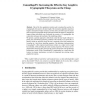Free Online Productivity Tools
i2Speak
i2Symbol
i2OCR
iTex2Img
iWeb2Print
iWeb2Shot
i2Type
iPdf2Split
iPdf2Merge
i2Bopomofo
i2Arabic
i2Style
i2Image
i2PDF
iLatex2Rtf
Sci2ools
104
click to vote
ACNS
2004
Springer
2004
Springer
CamouflageFS: Increasing the Effective Key Length in Cryptographic Filesystems on the Cheap
One of the few quantitative metrics used to evaluate the security of a cryptographic file system is the key length of the encryption algorithm; larger key lengths correspond to higher resistance to brute force and other types of attacks. Since accepted cryptographic design principles dictate that larger key lengths also impose higher processing costs, increasing the security of a cryptographic file system also increases the overhead of the underlying cipher. We present a general approach to effectively extend the key length without imposing the concomitant processing overhead. Our scheme is to spread the ciphertext inside an artificially large file that is seemingly filled with random bits according to a key-driven spreading sequence. Our prototype implementation, CamouflageFS, offers improved performance relative to a cipher with a larger key-schedule, while providing the same security properties. We discuss our implementation (based on the Linux Ext2 file system) and present some pre...
| Added | 20 Aug 2010 |
| Updated | 20 Aug 2010 |
| Type | Conference |
| Year | 2004 |
| Where | ACNS |
| Authors | Michael E. Locasto, Angelos D. Keromytis |
Comments (0)

